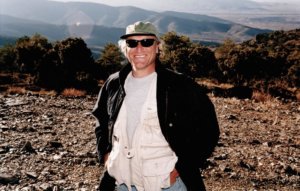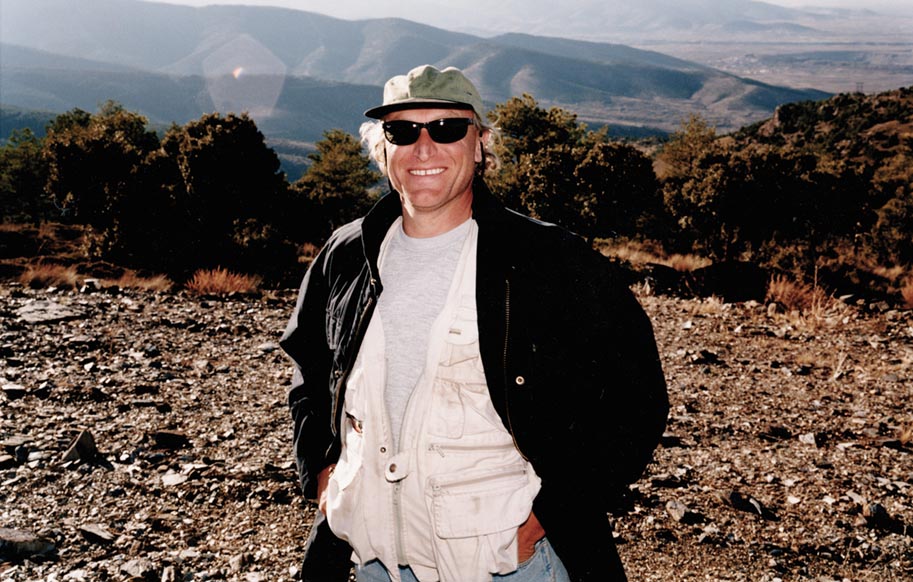 Bill Bristow had persuaded his father to reveal his secrets in a book, and had enjoyed success in film in LA. But it was time for a change. Roz Whistance tells part two of his story.
Bill Bristow had persuaded his father to reveal his secrets in a book, and had enjoyed success in film in LA. But it was time for a change. Roz Whistance tells part two of his story.
ON the one hand he was at the thick of it. Bill Bristow was working with actor Rutger Hauer on various projects and was involved with the great and the good in the film world. But he was becoming disillusioned. Nothing had come of a couple of screenplays he had written, his marriage had failed and the sheer excess of the States was starting to grate with him.
“There is a side to me that doesn’t like seeing money spent just because you can spend it,” he says. “I was working on a commercial near where, just two years before, I’d made ‘Who Are They?’ my movie about the homeless. We, the people working on the commercial, were given lunch, and it was a food spread the like of which in all my years of working on movies I’d never seen: – there was roast beef, there was smoked salmon, fresh salmon, salmon from Alaska and salmon from Canada, lobster, king prawns… And when we’d eaten all we wanted, the director said ‘I want the beef for my dog’. There was this joint about this size” (stretching his arms akimbo) “and this much (wedge about the size of a small paperback) eaten.”
At the time Bill knew that the actor Dennis Weaver had just started a charitable food collection service for the homeless, so he phoned the organisation to collect the remains of the spread. The director was livid, but Bill pointed to a group of homeless people nearby to remind him that life chances are tenuous: “You muck up on the next commercial and that could be you.” When it turned out to be Dennis Weaver himself who arrived to collect the food, the director appeared the model of generosity.
 So in 1990 he left Los Angeles and moved to Spain where his parents were living. It was 1990. His father, who, as Bill had discovered when he was a child had been a spy, had been working on his memoirs but the ghost writer he had employed had pulled out. So Bill persuaded the publisher that he was capable of writing the book. “It took about a year-and-a-half of fights and struggles,” he says, adding that the chief difficulty was that his father never took anything too seriously, making the facts slow to come; and that now and again he would get collywobbles about the Official Secrets Act. In the end an over-judicious former colleague got wind of its imminent publication and Bill and his father had to get the book published in Spain. Three days later, having been in the public domain, it was published in the UK with impunity.
So in 1990 he left Los Angeles and moved to Spain where his parents were living. It was 1990. His father, who, as Bill had discovered when he was a child had been a spy, had been working on his memoirs but the ghost writer he had employed had pulled out. So Bill persuaded the publisher that he was capable of writing the book. “It took about a year-and-a-half of fights and struggles,” he says, adding that the chief difficulty was that his father never took anything too seriously, making the facts slow to come; and that now and again he would get collywobbles about the Official Secrets Act. In the end an over-judicious former colleague got wind of its imminent publication and Bill and his father had to get the book published in Spain. Three days later, having been in the public domain, it was published in the UK with impunity.
The book had forged a bond between father and son which hadn’t previously existed and Bill describes the joy of endless evenings of drinking wine and talking about anything and everything. “I hadn’t known him before and felt so privileged. We drank – we got slaughtered! – and talked even about things I’d got up to at school, about everything I’d ever done. He was never judgemental.”
The book was finished and Bill decided not to go back to LA. “I’d de-Americanised myself, and thought if I go back, I’d be saying LA is my home. I’d marry an American woman, and have kids that chewed gum,” he grins, wincing as he imitates the accents and attitudes of US children. Then he met Judy, who had a property business in Spain. They now have a son, Bertie, who is 10, with an English accent and who, as far as Bill knows, doesn’t chew gum.
So they stayed, and Bill started a locations company, sourcing places for advertisers to shoot promotional films for the likes of Nissan, BMW, Land Rover and Toyota, and producing their brochures. “The company would give me the brief, and I might say ‘this needs to be done in Switzerland’. Then I’d be driving around for six days on my own, taking photos of wonderful scenery and architecture, and seeing how things worked in different bits of Europe or Morocco.”
It sounds an idyllic existence: but the sheer organisation involved in getting that shot of a car driving along an empty road, or into an apparently sleepy Moroccan town, is huge. A shoot in Valencia involved blocking one side of the bridge, which was a major traffic outflow from the centre. “It was Friday afternoon. We were going to be there about two hours, but we were there till 10 at night, holding up two lanes of traffic, while radio announcements told the angry drivers that the four-and-a-half km traffic jam was due to photographers shooting a Nissan commercial!” Honking and gesticulating drivers didn’t faze the policeman who had sanctioned the time extension: “He said: ‘don’t worry about it, they’re only going to go and get hookers, get drunk or go to the discotheque, they can wait!’”
 Fun in the fast lane took its toll on Bill, however. “I used to cry myself to sleep,” he says, recalling the pressure of producing the current film and brochure, all the while budgeting for the next. “I never saw Judy and when I saw Bertie I’d think ‘hey, you’ve grown!’ I had to get out.”
Fun in the fast lane took its toll on Bill, however. “I used to cry myself to sleep,” he says, recalling the pressure of producing the current film and brochure, all the while budgeting for the next. “I never saw Judy and when I saw Bertie I’d think ‘hey, you’ve grown!’ I had to get out.”
When he first arrived in Spain Bill started a news programme for a local TV station with an American journalist. “I couldn’t bear the fact the Brits out there were so ignorant about the country. So we translated half an hour of Spanish news into English.” Spain had been in Bill’s family a long time: his grandfather had copper mines there, and was the accountant for the first ever Spanish football team, Huelva Real FC. His father and elder siblings had been brought up there when his father was in MI6.
On the back of the TV work, Bill was asked to produce a rock festival in Malaga, dealing with radio coverage, promotion and posters. It showcased a mix of musicians from bands which had been big in the 1960s and 70s; Arthur Brown, the Pretty Things, Lena Lovage, Bad Company – even someone from the Bay City Rollers. “I ended up being best man at Arthur Brown’s wedding, at the festival venue,” says Bill with his slightly baffled smile. “God knows why, it’s not as if we knew each other well.”
Bill still has his locations business in Spain, but you detect a slight disillusionment with the country and what it has to offer. “Everyone is so materialistic, kids are buying on credit from the age of 16: and the people are just rude.” His wife Judy used to have a relocations business, sourcing wonderful properties for foreign buyers, but as the quirky dwellings dried up it became less fun. Bill, Judy and Bertie Bristow decided to move to the Isle of Wight.
His connections with Rutger Hauer have continued over the years, with Bill helping him with the Rutger Hauer Filmfactory, in Rotterdam, which now is an annual film school event. Since 2008 he has been master of ceremonies at I’ve Seen Films, a festival in Milan, as well as sitting on the judging panel with such household names as Ridley Scott, Christopher Nolan, Robert Rodriguez, and Miranda Richardson.
And now would it be too fanciful to say that all those many strands of Bill Bristow’s life are being drawn together, with his move to the Isle of Wight? Certainly he has not rested on his laurels (one wonders if he has any) since moving here under six months ago. He attended a Conservative Club meeting, came out with some good ideas, and is now considering standing as a Councillor. Moreover he is bringing his life in films to the Island. “I want to set up a film commission, and I am looking for help.”
Inspired by 10-year-old Bertie, he has plans to host a children’s film festival on the Island. “It’s a generation at ease with technology, and there are a lot of talented 12 year old kids making films, with nowhere to show them. Even if they grow up to be stock brokers, they need to be encouraged to hang on to their creative side! Colleagues on the I’ve Seen Films panel, with which I and Rutger Hauer are involved, agree that the Isle of Wight is the right venue. After all, it’s a festival destination.”



